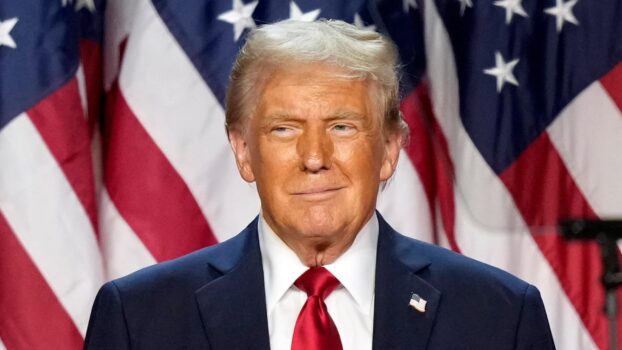 Financial markets worldwide plummeted Thursday in the wake of President Donald Trump’s announcement of extensive new tariffs, with U.S. stocks bearing the brunt of the selloff.
Financial markets worldwide plummeted Thursday in the wake of President Donald Trump’s announcement of extensive new tariffs, with U.S. stocks bearing the brunt of the selloff.
The S&P 500 dropped 4.3% in morning trading, putting it on track for its worst day since the COVID-19 market crash five years ago. The Dow Jones Industrial Average fell 1,538 points, or 3.6%, while the technology-heavy Nasdaq composite plunged 5.6% by 10:55 a.m. Eastern time.
Market turmoil was widespread as investors grappled with fears that the tariffs could create a dangerous combination of higher inflation and weakening economic growth. Even assets typically considered safe havens during market stress declined, with gold pulling back from recent record highs. Small-cap stocks were hit particularly hard, with the Russell 2000 index plummeting 6.6%, entering bear market territory after falling more than 20% from its peak.
While investors had anticipated Trump’s tariff announcement, the scale of the measures exceeded expectations. The plan includes a minimum 10% tariff on imports, with significantly higher rates for products from China and European Union countries.
According to UBS, these tariffs could reduce U.S. economic growth by up to 2 percentage points this year and push inflation close to 5% – a level that UBS strategists led by Bhanu Baweja consider so severe that it’s “plausible” but seems unlikely to be implemented in full.
Wall Street had previously assumed Trump would use tariffs primarily as a negotiating tactic rather than as permanent policy. However, Wednesday’s announcement suggests the president may view tariffs as a long-term strategy to return manufacturing jobs to the United States, a process that could take years.
If implemented as announced, stock prices may need to fall significantly further to reflect the potential global recession and impact on U.S. corporate profits. The S&P 500 is now down slightly more than 11% from its February record high.
Treasury yields tumbled on expectations the Federal Reserve might cut interest rates to support the economy, with the 10-year Treasury yield falling to 4.02% from 4.20% Wednesday and from around 4.80% in January. However, the Fed faces a dilemma, as lower rates could exacerbate inflation concerns already heightened by the tariff announcement.
Despite market turmoil, the U.S. economy continues to show resilience. Weekly jobless claims were lower than expected, and a report from the Institute for Supply Management indicated growth in the services sector, albeit weaker than forecasted. Businesses reported mixed conditions, with some already seeing disruptions from existing tariffs on materials like imported aluminum from Canada.
The selloff was broad-based, with four out of five stocks in the S&P 500 declining. Companies particularly vulnerable to tariffs saw steep drops: Best Buy fell 15.1% due to its reliance on globally manufactured electronics; United Airlines lost 13.1% amid concerns about reduced business and leisure travel; and Target tumbled 11.8% as investors worried about additional pressure on already-strained consumers.
International markets also suffered significant losses, with France’s CAC 40 dropping 3.4%, Germany’s DAX losing 2.9%, Japan’s Nikkei 225 falling 2.8%, Hong Kong’s Hang Seng declining 1.5%, and South Korea’s Kospi dropping 0.8%.

White House Says Military Option Open On Greenland Acquisition
Trump Calls Case Against Maduro “Infallible” Ahead Of U.S. Court Appearance
South Africa Raids U.S. Refugee Processing Centre, Arrests Seven Kenyans
Time Magazine Names AI Visionaries ‘Person of the Year’